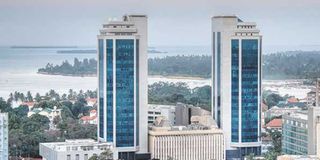BoT allays anxiety over forex reserves

Dar es Salaam. The Bank of Tanzania (BoT) said yesterday that it has upped gross official foreign reserves by $800 million during the past few weeks.
The BoT director of Economic Research and Policy, Dr Suleiman Misango, told The Citizen yesterday that, currently, Tanzania’s gross official foreign reserves stood at $5.2 billion.
That was an improvement from the $4.4 billion held inJune 2019 as reported in the BoT’s Monthly Economic Review (MER) for August 2019.
The $5.2 billion is enough to cater for Tanzania’s import requirements for a period of five months and one week.
“It is true that, in the August 2019 MER, we reported the gross official foreign reserves for June at $4.4 billion; but they are not static… We have since upped them to $5.2 billion, enough for import requirements for 5.1 months,” he said.
He said forex reserves can change over time - depending on a number of economic factors, including availability of foreign currency in the economy.
“We have been able to build reserves to $5.2 billion by purchasing forex from banks because they had excess. We also buy from the government from the forex inflows it receives,” he said.
Tanzania’s forex earnings were currently increasing, courtesy of improvement in service receipts, fuelled mostly by a rise in travel receipts.
The BoT says in its August MER that forex receipts from services rose to $4.068 billion in the year to June 2019 from $3.897 billion in the corresponding period in 2018.
“The rise was driven by travel receipts - mainly from tourism - which grew by 7.4 per cent to $2.488 billion, from $2.317 billion in the year to June 2018, owing to increasedtourist arrivals,” the BoT says.
Tanzania’s gross official foreign reserves were quoted at $5.484 billion at the end of June 2018 from $5 billion at the end of June 2017.
Eyebrows were raised when the BoT reported that gross official foreign reserves had gone down to $4.4 billion as of June 2019.
The ACT-Wazalendo Party Leader, Mr Zitto Kabwe, twitted earlier this week that the drop means that Tanzania’s ability to import its basic requirements during times of national emergencies had gone down.
But the twit was received with a reaction from former Home Affairs Minister Mwigulu Nchemba who asked Mr Zitto to understand what he termed as structural and seasonal effects on reserves.
“Mr Zitto, you are an economist. Is it true you do not understand structural and seasonal effects on reserves? Is it true that you do not know what our legally accepted minimum [gross official foreign reserves] is? The international level which is recommended by the World Bank is one that meets three months of import cover. [‘Bwana ZITTO!!!!!!. Wewe Ni mchumi, je Ni KWELI hujui Structural and Seasonal effects on reserves? Je Ni KWELI Kiwango chetu Cha Kisheria hukijui? Kiwango Cha kimataifa Kama Benk ya Dunia inavyotaka Ni miezi mitatu tu(3 Months of Imporrts tu’)]. twitted Dr Nchemba who served as deputy finance minister during the last days of former President Jakaya Kikwete’s administration.
Central banks across the world keep foreign exchange reserves for several reasons, including the need to keep the value of their currencies at a fixed rate.
Among the reasons central banks also keep foreign exchange reserves to maintain liquidity in case of an economic crisis.
Reserves are also needed to make sure a country will meet its external obligations, including international payment obligations such as sovereign and commercial debts.
The World Bank recommends that a country must hold gross official foreign reserves that can cater for import requirements for a period of three months.


